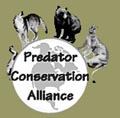Forest Predator Ecosystem Protection Program
The main focus of this program is to ensure that predatory wildlife, specifically the black bear, fisher, grizzly bear, lynx, marten, mountain lion, northern goshawk, wolf and wolverine, remain an integral part of the forests of the northern Rockies. Most of these species are dependent on large tracts of intact forest.
In this program, we seek to protect the present populations of forest predators and their habitats, and to restore those populations and habitats that have been drastically reduced or lost.
We work to protect predatory wildlife from excessive trapping, excessive hunting, or unintentional or illegal killing.
We advocate for improved state and federal management of these forests with the goal of having these species distributed in self-sustaining numbers across the region. We also pursue administrative and legal avenues in cases where state or federal practices clearly threaten these wildlife populations.
A major component of this program is the Roads Scholar Project which deals with the impacts of excessive roads and motorized recreation on National Forest lands. Motorized recreation, in the form of all-terrain vehicles, motorcycles and snowmobiles, is documented to disrupt wildlife behavior, destroy wildlife habitat, damage fisheries, and cause erosion. We work with the U.S. Forest Service and volunteers to obliterate certain inappropriate roads and trails for the benefit of all wildlife and ecosystem health.
In all, we:
1) collect the best scientific data and new field data to help inform our positions and advocacy work, and so that we can share this information with other conservation groups and public agencies to help guide and prioritize their monitoring and protection efforts.
2) identify priority habitat areas where we focus our advocacy efforts.
3) monitor state and federal agencies policies and plans, and administratively or legally challenge those policies and plans that result in significant loss of forest predators or their habitats.
4) work to restore our priority habitat areas, with a focus on reducing roads and motorized travel.
5) promote a "landscape view" of roads and off-road vehicle use so the conservation community and management agencies will address motorized travel as a whole, rather than continuing the historic approach of addressing roads and off-road vehicle use as separate issues.
Grassland Predator Ecosystem Protection Program
This program exists to expand and protect a system of secure grassland habitats capable of sustaining populations of the black-footed ferret, swift fox, burrowing owl and ferruginous hawk. These predatory species face an uncertain future, largely due to the precipitous decline of the prairie dog ecosystem.
A major focus of this program deals with prairie dogs which create habitat or provide food for so many other grassland species. Prairie dogs have been reduced to 1% of their historic range by habitat destruction, poisoning and shooting.
Our vision is to work with land management agencies, tribal groups and land owners to restore prairie dogs to 10% of suitable habitat on public lands by reducing the threats to this key grassland species.
Living With Predators Program
The goal of this program is to encourage people living, working and recreating in the northern Rockies and High Plains to do so harmoniously with predators by reducing and resolving human/predator conflicts without resorting to lethal measures.
When predators' needs conflict with people and their property, predators invariably lose - with their lives.
We work to provide the public with information and tools needed to reduce human/predator conflicts.
Voices for Predators Program
Our main interest in this program is to increase public understanding and support for predatory wildlife and our conservation work.
We believe the best way to advance the adoption of policies and practices that protect and restore native predators is to engage, inform and mobilize our members and the public to use their voices and talents in support of these magnificent and worthy creatures.
